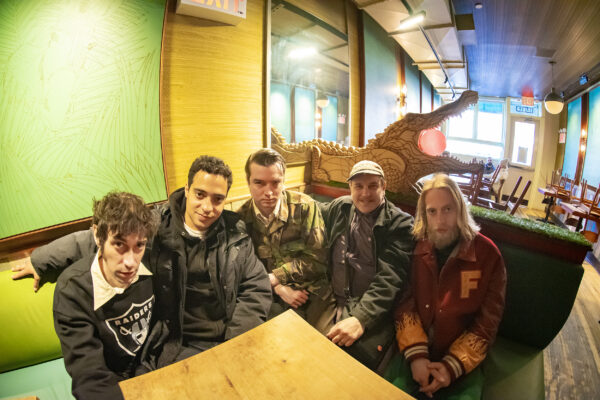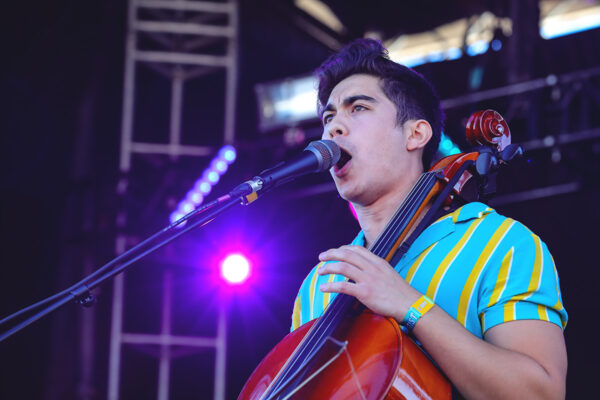Scheduled for release this January, Wray’s upcoming album, Hypatia, will be their first since their 2014 self-titled debut. Discussing their new music just moments after receiving one of the first physical copies of their second record, drummer Blake Wimberly spoke about creative changes and how their varied influences are expressed by each member of the trio in very different ways.
“After two albums, it’s definitely starting to change, which it naturally would- working with three people overtime. But yeah, I mean in the beginning there was a pretty specific sound I was going for, or style. And I knew the two of them would bring there’s so it kind of worked together as a bit of a soup.”
This past October, Wimberly, guitarist David Swatzell and bassist David Brown gathered at their record label’s home base in Birmingham, AL to speak to Pancakes and Whiskey by phone. Describing their origins, collaborative nature and how the band’s vibrant blend of dreampop and shoegaze developed from their initial roots in their native city’s punk scene, Brown began by saying, “It’s always been a good scene here- we all grew up playing music in various bands,” before later acknowledging how the diversity of the scene can come as a surprise to those outside it’s zip code.
“There’s always been those sort of post rock, post punk influences going on in Birmingham. Then also, in the late eighties, early nineties, there was a big shoegaze influence here because bands like Ride and My Bloody Valentine played in Birmingham in the early nineties. So there’s kind of always been that here, but I would say that outside of the state or outside of the city, yeah, it is more expected to just have more of a Southern rock theme.”
Having played together in bands on and off over the past ten years, Brown and Swatzell formed Wray with Wimberly two years ago. Describing how all of their ideas for the project had naturally aligned, Swatzell said, “We kind of had in mind when we were starting this band, really what we wanted to do from the get go. A lot of that was because we hadn’t really done something like this before with our past bands, and we’ve always wanted to.”
With both Swatzell and Brown originally on guitar, the group’s sound began to flourish soon after Brown moved to bass. Providing themselves time to strengthen their material, Swatzell explained how, “We even took a good six months to flesh it all out, before we even played a show or anything. We just worked on stuff and it just all kind of came together over like half a year or so.”
After recording their first album, Wray, the group received critical acclaim from national publications including The New York Times and The Guardian. Beginning work on Hypatia soon after, they recorded the album at the Birmingham studio of their label, Communicating Vessels, where it was engineered by Lynn Briges (Devendra Banhart, Dexateens), mixed by Daniel Farris (St. Vincent, Polyphonic Spree, Man or Astro-Man?) and mastered by Paul Logus (Public Enemy, Anthrax). And while the group will occasionally do some writing in the studio, Swatzell explained how, “Most of the time, we map it out all ahead of time. Then when we get to the studio, we might mess with the arrangement or something.”
Describing the writing process, Wimberly spoke about taking their time with the songs and how each is either refined or revised once the band enters the studio.
“I would say a lot of songs keep their initial form, but especially on this last album, once we got into the studio we wanted to make a point to play around with the space and time that we had, instead of just running in and like recording everything in three days. So there were some songs that just weren’t sitting right or needed something different, and they ended up being a good bit different than what we had going into the studio.”
Although when asked if they would consider Hypatia to be indicative of a new direction or a continuation of the sounds and ideas explored on their first record, Brown explained how it is more of a combination of each.
“I would say both because it is organically a continuation of the first record but we intentionally, and unintentionally, went into a specific direction. And I think that just comes from being in a band for two years and just the way our writing was molded into one direction. I think that it is a continuation but I think it’s definitely more of a record. I mean the first one, like you called it an EP and we never know what to call it, whether it’s an album or an EP because it’s seven songs at twenty-seven minutes, and it’s kind of that in between. And that was because those were just the songs that we had written at the time that we went in and recorded them. But with this new record, we spent a lot more time on it. There’s interludes and weird intro, outro songs and it’s a full forty-minute record. So I think in that respect it’s different than the first record.”
Also the group’s lyricist, Brown spoke about being influenced by new wave music, before discussing Hypatia’s structure and the incorporation of futurism and romanticism based themes.
“I think sonically there is a theme because there’s all these short repetitive parts and then you’ll have kind of a drive-y part, and then a lot of our songs will open up. Then they’ll either fall back down or they’ll just end abruptly. A lot of those concepts are carried out throughout the entire record. So that’s from a sonic standpoint. From a lyrical standpoint, I was able to take a larger number of songs and really think about my lyrics and the song titles, and work a stronger lyrical theme into this record.”
Achieving that same level of cohesiveness and unity onstage, Wray has been consistently praised for producing a live show where the mood is vivid and unbroken. Largely refraining from conversation in between songs, Brown agreed that any onstage banter would only remove the audience from the otherworldly atmosphere being created.
“I think that it does disturb the vibe of the show, if we were to do that, it would. We’ll say usually at the end of a show, ‘Thanks for watching, we’re Wray,’ but I don’t think most people can even understand that- the vocals are buried in the mix of our live sound for a reason. And now especially, we try not to have hardly any dead space between songs. Blake has started using a sampler in between songs so that it has this kind of flow, and it doesn’t really break.”
Regularly utilizing low lighting and striking projections that appear over their figures, Wimberly spoke about the band’s use of visual components and their hypnotic impact.
“It doesn’t always have to be projections over us or anything like that, but I do really enjoy going to shows that you can get lost through your eyes as well as your ears.”
See Wray In New York 11/10 at Shea Stadium & 11/11 in at Arlene’s Grocery
Hypatia Available January 2016
Article: Caitlin Phillips




